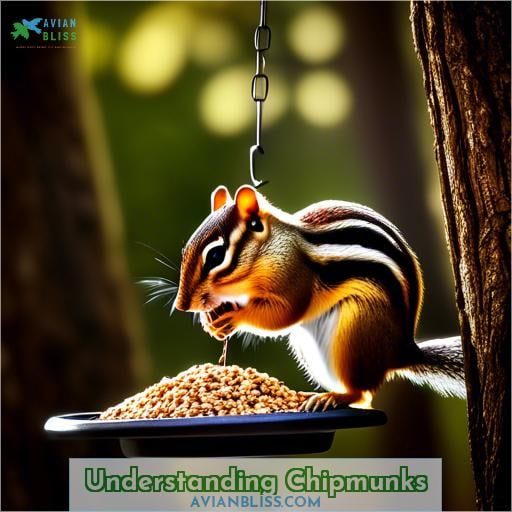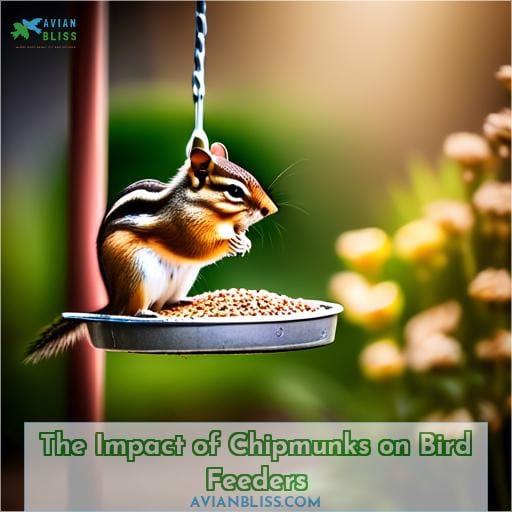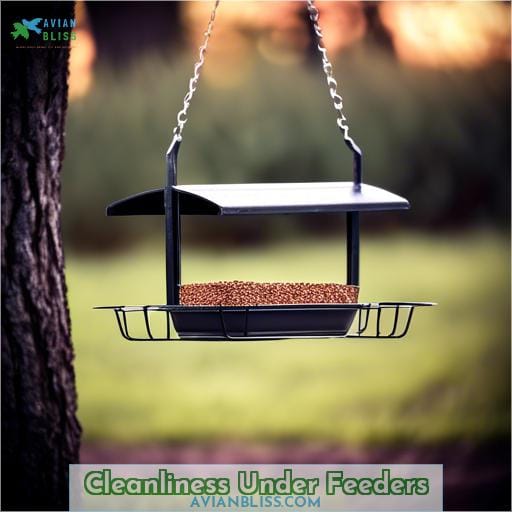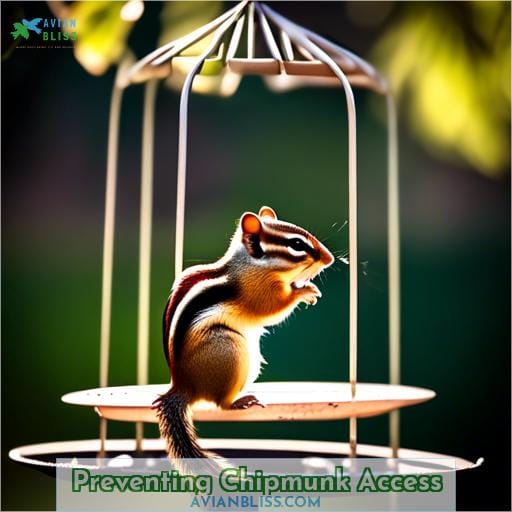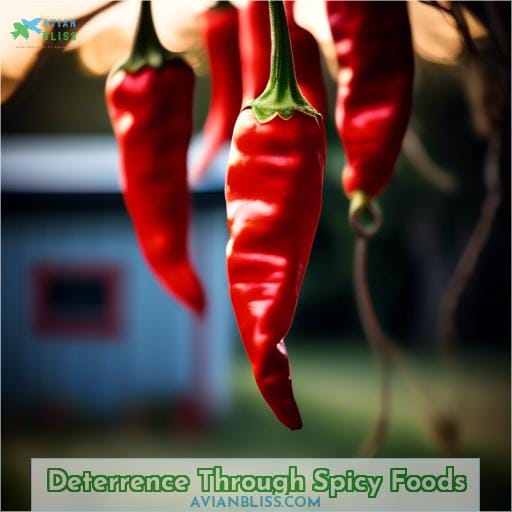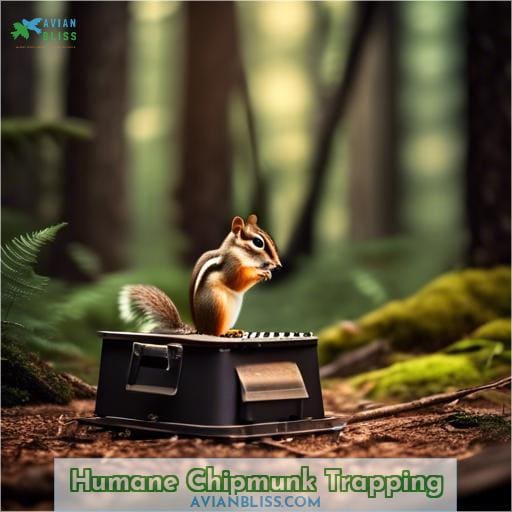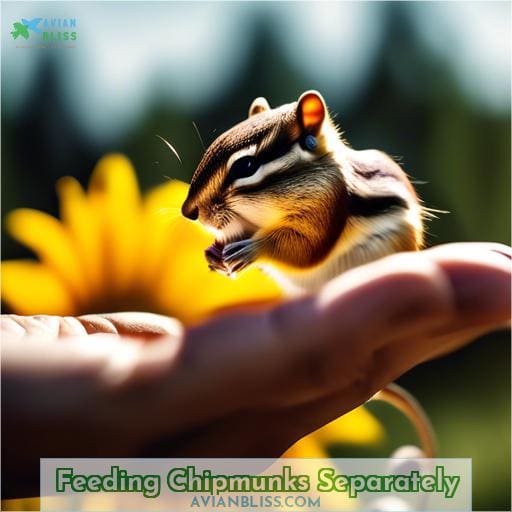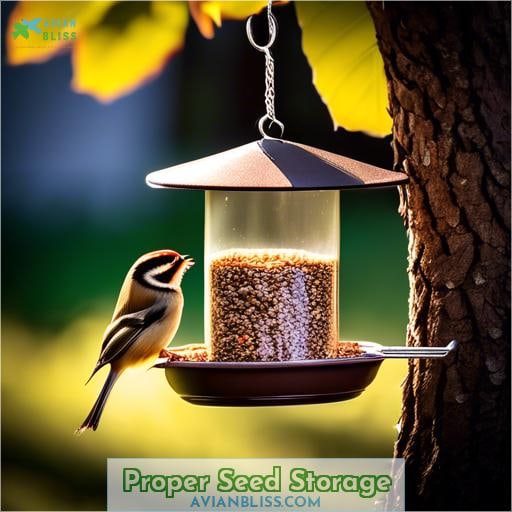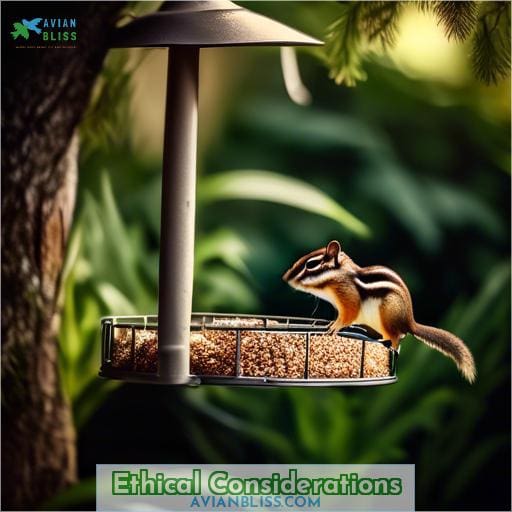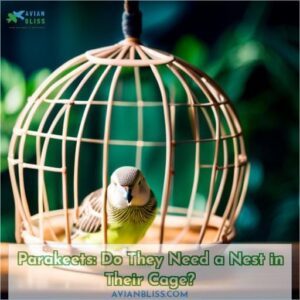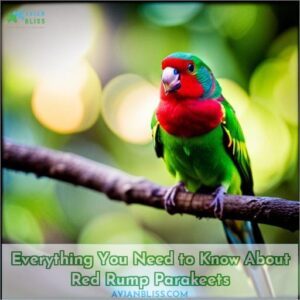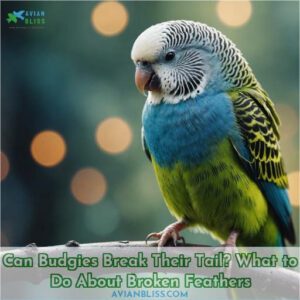This site is supported by our readers. We may earn a commission, at no cost to you, if you purchase through links.
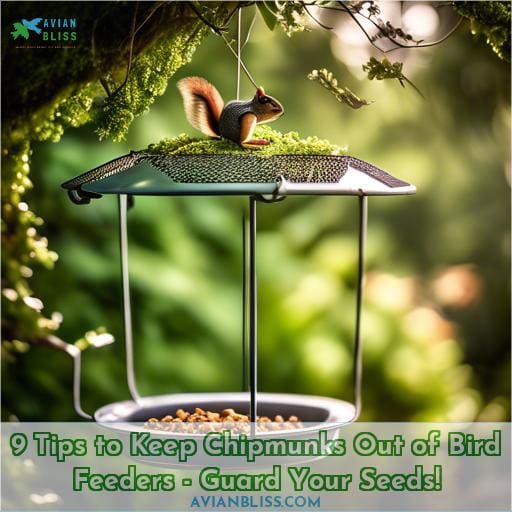 Facing chipmunk invasions at your bird feeder can be frustrating, but you’re not powerless.
Facing chipmunk invasions at your bird feeder can be frustrating, but you’re not powerless.
This guide offers 9 tips on how to keep chipmunks out of your bird feeders, ensuring your feathered friends get their share without unwanted guests.
From strategic feeder placement to employing clever deterrents, you’ll learn how to create a chipmunk-proof feeding station.
Embrace these tactics to protect your seeds and enjoy uninterrupted birdwatching in your backyard sanctuary.
Table Of Contents
Key Takeaways
- Chipmunks are adept at finding easy meals, and their intelligent behavior can make them persistent visitors to bird feeders, where they can cause damage through their gnawing habits and love for seeds.
- Maintaining cleanliness by managing the mess under bird feeders, such as installing trays to catch spilled seeds and opting for shelled sunflower seeds, can help keep chipmunks at bay and minimize the mess.
- Baffles installed on feeder poles can be an effective way to prevent chipmunks from climbing up to the feeders, and selecting rodent-proof poles or hanging feeders with fishing line can further deter their access.
- Using spicy foods like hot pepper seeds, which are irritating to mammals but not to birds, can serve as a safe and effective deterrent to keep chipmunks away from bird feeders.
Understanding Chipmunks
Let’s dive into the world of chipmunks, those cheeky critters that can turn your bird feeder into their personal buffet.
Understanding their habitat, hibernation patterns, and diet is key to keeping them at bay. Chipmunks are savvy, with a knack for finding the easiest meal around—often your birdseed. They’re not just cute faces; their behavior, including reproduction and foraging habits, plays a big part in their visits.
While they share the squirrel family tree, chipmunks have their unique quirks. Using a baffle might stump squirrels, but chipmunks, with their ground-dwelling instincts, need a different approach.
The Impact of Chipmunks on Bird Feeders
After getting to know our furry little friends in the previous section, let’s dive into how chipmunks can turn your bird feeder into their personal buffet. These critters aren’t just cute; they’re clever and determined, making them quite the challenge to keep at bay.
- Chipmunks’ gnawing habits can ruin feeders, turning your investment into toothpicks.
- Their love for seeds means your bird seed won’t last long.
- Their digging can disrupt your garden’s peace.
- Their intelligence makes them tricky to deter.
- Their ecological role is significant, but so is the need to protect your bird feeder.
Understanding chipmunk behavior is key to deterring them effectively. Let’s keep those feeders for the birds, shall we?
Cleanliness Under Feeders
To keep chipmunks at bay, it’s crucial to manage the mess under your feeders. Installing trays and opting for shelled sunflower seeds can significantly reduce food spillage.
Preventing Food Spillage
Keep those cheeky chipmunks at bay by tackling bird seed spillage head-on. A cleverly designed seed tray can catch those escapee seeds, ensuring ground-feeding birds get a feast without inviting unwanted guests.
Opt for shelled sunflower kernels to minimize mess and maximize consumption. Remember, spill prevention starts with proper seed storage—keep it tight to prevent a free-for-all buffet.
Installing Trays for Spilled Seeds
After tackling food spillage, let’s zero in on trays.
A savvy tray design under your feeder can be a game-changer, ensuring seed distribution stays off the ground and away from those cheeky chipmunks.
Opt for durable tray materials that can withstand the elements and attach securely to your pole or tree branch—your feathered friends will thank you, and squirrels will have to look elsewhere!
Opting for Shelled Sunflower Seeds
Switching to shelled sunflower seeds is a game-changer in your battle against chipmunk invasions.
- Seed Type: Shelled seeds reduce mess, making your feeder less of a chipmunk magnet.
- Feeding Habits: Birds love them, but without the shells, there’s less for rodents to pilfer.
- Cost Comparison: Initially pricier, but you save by avoiding seed waste and potential feeder damage.
No bundt pan tricks or spicy deterrents needed!
Preventing Chipmunk Access
To keep those crafty chipmunks at bay, consider installing baffles on your feeder poles; they’re a proven barrier against these agile climbers. Opt for rodent-proof poles and hang your feeders with fishing line to outsmart these persistent critters.
Utilizing Baffles on Feeder Poles
After ensuring your feeder area is as neat as a pin, it’s time to tackle chipmunk access with a clever twist: baffles. Think of baffles as the secret sauce to keeping those cheeky critters at bay. They’re not just effective; they’re also a sight for sore eyes.
| Baffle Design | Baffle Placement | Baffle Stability |
|---|---|---|
| Sleek yet sturdy | High enough to challenge | Firm to withstand winds |
By incorporating baffles, you’re not just outsmarting chipmunks; you’re setting the stage for peaceful bird watching. Plus, it’s a chance to add a touch of flair to your garden. And who knows? Maybe you’ll find the perfect baffle on your next thrift store adventure.
Selecting Rodent-Proof Poles
When choosing a pole for your bird feeder, think fortress, not just a stick.
Opt for materials that send chipmunks packing—think slick, not snackable.
Height matters; aim high to keep the critters at bay.
A slim diameter means no grip for tiny paws, and location is key—avoid chipmunk highways.
Hanging Feeders With Fishing Line
Hang your bird feeders with fishing line; it’s a slick trick that squirrels can’t grasp. This invisible barrier lets birds perch with ease, turning your feeder into a no-squirrel zone. Add a baffle for double trouble, and watch those acrobatic chipmunks meet their match.
Deterrence Through Spicy Foods
Capsaicin’s role in deterring chipmunks is key; it irritates mammals but doesn’t affect birds. Hot pepper seeds have proven effective, offering a spicy solution to keep your feeders safe.
The Role of Capsaicin
After you’ve set up your chipmunk-proof fortress with baffles and fishing line, it’s time to spice things up with a fiery deterrent.
- It’s a safe birds’ delight but a chipmunk’s nightmare.
- Adds captivating qualities to your feeder.
- Chipmunks find the heat unbearable.
- Their charming antics won’t include feeder raids.
Effectiveness of Hot Pepper Seeds
Diving into the effectiveness of hot pepper seeds, you’ll find it’s a spicy solution that chipmunks can’t stomach, but birds gobble up without a hiccup.
| Aspect | Detail |
|---|---|
| Types of Feeders | Suitable for most |
| Birds Unaffected | All species |
| Safety for Birds | Completely safe |
| Long-term Effects | None on birds |
Humane Chipmunk Trapping
You’ll find that humane chipmunk trapping is a gentle way to address feeder raids. It’s crucial to approach relocation with care, ensuring it’s done kindly and effectively.
Easy Catch and Release Methods
When you’re outwitting those cheeky chipmunks, think like a master of cage building. Choose your trap type wisely—live traps are your friend. Slather on the peanut butter, the bait option they can’t resist.
Importance of Kindness in Relocation
After you’ve gently caught those cheeky chipmunks using sunflower seeds, it’s time to focus on their humane relocation.
- Choose a suitable habitat for release.
- Ensure non-lethal deterrents are in place back home.
- Support wildlife coexistence by avoiding residential areas.
- Practice habitat modification to discourage return visits.
Feeding Chipmunks Separately
If you’re struggling with chipmunks at your bird feeders, consider setting up a separate feeding area just for them. Stocking it with sunflower seeds can distract them from your bird feeders and keep both parties happy.
Creating Dedicated Feeding Areas
After mastering the art of humane trapping, consider setting up a dedicated feeding area for your chipmunk guests.
Use a variety of sunflower seed types in sturdy tray materials, placed strategically away from bird feeders.
This not only diverts their attention but also respects bird preferences.
Using Sunflower Seeds for Chipmunks
Feeding chipmunks separately with sunflower seeds can be a game-changer. It’s like giving them their own VIP dining area, away from the bird feeders. This strategy not only keeps them entertained but also minimizes conflicts with squirrels.
- Sunflower seed alternatives offer variety.
- Understanding chipmunk feeding habits helps tailor their dining experience.
- Seed storage options ensure freshness and deter pests.
Proper Seed Storage
After setting up a separate feeding area for chipmunks, it’s crucial to focus on proper seed storage.
- Container Selection: Opt for rodent-proof containers. Galvanized steel or heavy-duty plastic with secure lids are your best bets.
- Pest Prevention: Place your storage containers in a cool, dry area to deter pests and maintain seed freshness.
- Pantry Organization: Organize your seeds in a way that makes it easy to grab what you need without spilling, reducing attractants for rodents.
- Rodent Exclusion: Regularly inspect your storage area for signs of intrusion and seal any gaps.
By mastering the art of seed storage, you’re not just organizing your pantry; you’re fortifying your bird feeding sanctuary against unwelcome guests.
Ethical Considerations
It’s crucial to steer clear of harmful deterrents when managing chipmunks around your bird feeders. Avoid using poisons and sticky substances, as these can cause unnecessary suffering and impact other wildlife.
Avoiding Harmful Deterrents
In your quest to keep those cheeky chipmunks at bay, remember, it’s a fine line between deterrence and harm.
Opt for bird feeder designs that outsmart, not outfight.
Humane trapping techniques and understanding chipmunk behavior can turn a battle of wits into a peaceful coexistence.
Ethical considerations should guide your strategy, ensuring deterrent effectiveness without crossing into cruelty.
Let’s keep it kind and clever!
Steering Clear of Poisons and Sticky Substances
Steering clear of poisons and sticky traps is key in keeping chipmunks at bay, ethically.
- Understand chipmunk behavior to predict their moves.
- Store seeds securely to avoid tempting them.
- Opt for alternative deterrents like spicy seeds.
- Practice humane relocation if needed.
Frequently Asked Questions (FAQs)
How do chipmunks affect local bird populations?
Chipmunks, those cheeky little bandits, can raid bird feeders, stealing seeds meant for your feathered friends. This not only deprives birds of food but can also disrupt local bird populations by reducing available resources.
Can chipmunks transmit diseases to birds?
Chipmunks can indeed spread diseases to birds, acting as furry little vectors for ailments that could harm your feathered friends.
Are there any environmental benefits to chipmunks?
Chipmunks aren’t just cute; they’re eco-warriors! They spread seeds and fungi, helping forests thrive. So, while you’re outsmarting them at your bird feeder, remember they’re doing their bit for Mother Nature’s big picture.
How do seasonal changes impact chipmunk behavior?
Seasonal changes trigger chipmunks to hibernate or forage more, depending on food availability and temperature. They’ll stash or snack on your birdseed, so stay sharp and keep your feeders chipmunk-proof!.
What are the long-term effects of deterring chipmunks?
Ye olde chipmunk deterring strategies, while effective, foster a safer, chipmunk-free zone, ensuring your bird feeders remain intact. Over time, you’ll enjoy a harmonious backyard, minus the furry little seed pirates.
Conclusion
Arming yourself with these 9 tips on how to keep chipmunks out of your bird feeder is like building a fortress; it’s your first line of defense in safeguarding your feathered friends’ feast.
By embracing cleanliness, employing strategic deterrents, and fostering a humane approach, you’re setting the stage for a harmonious backyard ecosystem.

